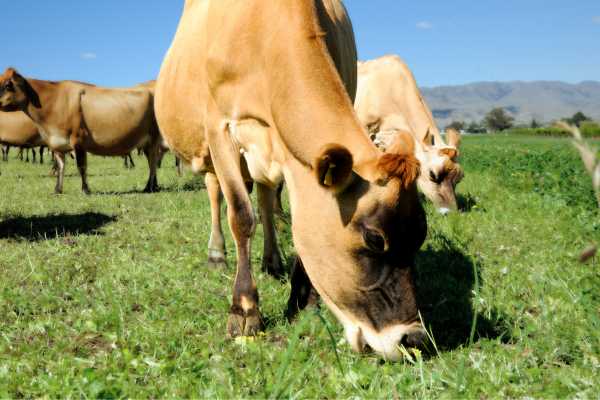Nature’s synthetic fertiliser fix
Tasmanian dairy farms are putting soil microbes to the test in bid to reduce emissions and boost productivity.

A trial using naturally occurring soil microbes is helping Tasmanian dairy farmers grow more grass while using significantly less synthetic fertiliser.
The trial, now in its third year, is showing early signs of success across eight farms covering 500 hectares in northern Tasmania, as recently reported on ABC’s Landline.
With synthetic fertilisers under increasing scrutiny for both environmental and economic reasons, the trial is testing whether targeted microorganisms – some of which can draw nitrogen from the air – can cut fertiliser use without compromising soil health or pasture growth.
Excessive use of synthetic urea, a common nitrogen fertiliser, can make soil more acidic and release pollutants like nitrous oxide – a potent greenhouse gas with a lifespan of over 100 years – into the air, and nitrogen into waterways, contributing to algal blooms.
Fonterra, which buys milk from some of the participating farms, is monitoring the results closely with these problems in mind. “So we’re trying to reduce nitrogen loss out of the system, both up and down,” said Dr Richard Rawnsley, an agronomist with the NZ dairy processing giant.
"We’re growing an extra three tonnes of dry matter per hectare – when you multiply that out it’s a much bigger gain than what we’re saving from the urea, but when you add those together, now you start to get some big numbers coming through."
Agronomist Hiren Bhadani proposed the trial in 2022 while working on one of the participating farms, and he is now conducting the research as part of his master’s studies with the eight farms simultaneously cutting back their synthetic fertiliser use as part of the trial.
His work is focused on a select group of four microbial species imported from India – two that fix nitrogen from the air and two that help unlock forms of phosphorus and potassium otherwise unavailable to plants.
These microbes are sprayed onto paddocks in liquid form, Bhadani said. In one 50-hectare trial, the winning combination was microbes paired with one-quarter less urea, a mix that could reduce a farm’s fertiliser costs by thousands of dollars a year.
Synthetic fertiliser savings
“We’re actually growing more grass with less fertiliser,” said George Rigney, the Cressy dairy farmer who employed Bhadani in 2022 and who was the first to participate in the trial.
“We’re growing an extra three tonnes of dry matter per hectare – when you multiply that out it’s a much bigger gain than what we’re saving from the urea, but when you add those together, now you start to get some big numbers coming through.”
Increased microbe density could further reduce the need for fertiliser, and Bhadani hopes to reach a point where microbes make up 50 per cent of each gram of soil and synthetic urea use can be cut by up to 40 per cent.
The microbes are manufactured by a company in India, which is supported by the Indian government to develop climate-friendly agricultural products.
Bhadani is now considering a PhD in microbiology and may look to manufacture the microbes under licence here in Australia.
The trial centres on four strains of soil microbes originally developed in India. Two of the species are nitrogen-fixers – microorganisms that extract nitrogen from the atmosphere and convert it into a form that plants can use. The other two species unlock complex forms of phosphorus and potassium, freeing up nutrients already present in the soil. The microbes are applied as a liquid spray directly onto paddocks. Once established in the soil, they work in tandem with reduced levels of synthetic fertiliser – in this case urea. The early results suggest that combining the microbes with 25 per cent less urea leads to increased pasture growth, lower soil acidity, and reduced input costs. The trial is the first time the species have been tested in Australia on a large scale with an eventual goal to produce the microbes locally under licence.





